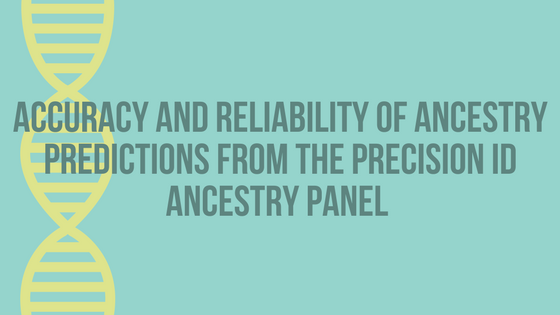As single nucleotide polymorphism (SNP) analysis by massively parallel sequencing (MPS) becomes increasingly prominent, research on commercially-available panels is essential prior to implementation. SNPs can be used as supplementary information to existing STR profiles, thus giving investigators more information to work with.
Written by: Ashley Cooley, ORISE/FBI Visiting Scientist
For this study, we focused on evaluating the genotype reproducibility, sensitivity, and performance of the Precision ID Ancestry Panel on the Ion Torrent™ PGM™ Sequencer with high-quality samples (9948, HeLa, etc.) and forensic-type samples (toothbrush, hair, cigarette butt, chewing gum, etc.). We also looked at the ability to use FROG-kb, a SNP reference/resource tool, to determine genotype reliability from samples of various simulated degradation levels. Traditional extraction and quantitation procedures were used prior to library preparation for MPS processing.
The panel performed well with high-quality samples of Caucasian and African ancestry with root populations which were correctly predicted in 100% of samples, with the exception of one Hispanic sample. Before making conclusions regarding the latter observation, additional Hispanic samples need to be examined. We also found that FROG-kb is capable of correctly predicting the ancestry of a degraded sample when amplicon lengths are > 75 base pairs (bp), therefore giving scientists a guideline for when ancestry can be accurately predicted from challenging casework samples. Forensic-type samples performed moderately well with 72% of replicates giving concordant ancestry predictions. Given this, the Precision ID Ancestry Panel has a potential use in forensic casework, following further testing and evaluation.
You may also like:
Generating a Suspect’s Mugshot from Solely DNA
Phenotyping: Intelligence and the Judicial Process
STR and SNP Genetic Analyses of the Yavapai Native Americans using Massively Parallel Sequencing
Moving to Massively Parallel Sequencing (MPS) in the Forensic Lab
While completing my Master’s degree, I became interested in the utility of MPS and its potential impact for casework. I had the opportunity to perform MPS research through the Visiting Scientist Program (Oak Ridge Institute for Science and Education [ORISE]) at the Counterterrorism and Forensic Science Research Unit (CFSRU). Through this program, I was able to complete the research on the Precision ID Ancestry Panel, which only increased my enthusiasm to study MPS. The entirety of the research was completed under the supervision of Dr. James Robertson (CFSRU).
Regarding the impact of my work, SNPs could provide valuable information on biogeographic ancestry for investigative leads or in cases where traditional STR typing results in an incomplete profile or no match in the national database. Other SNPs that are identity, phenotypic, or lineage informative can also be typed using MPS. Therefore, with more research, the introduction of this technology in the future could aid by filling information gaps in forensic casework. My future plans include continuing research on MPS platforms and genotyping challenging samples.
Would you like to see more articles like this? Subscribe to the ISHI blog below!
Subscribe Now!


